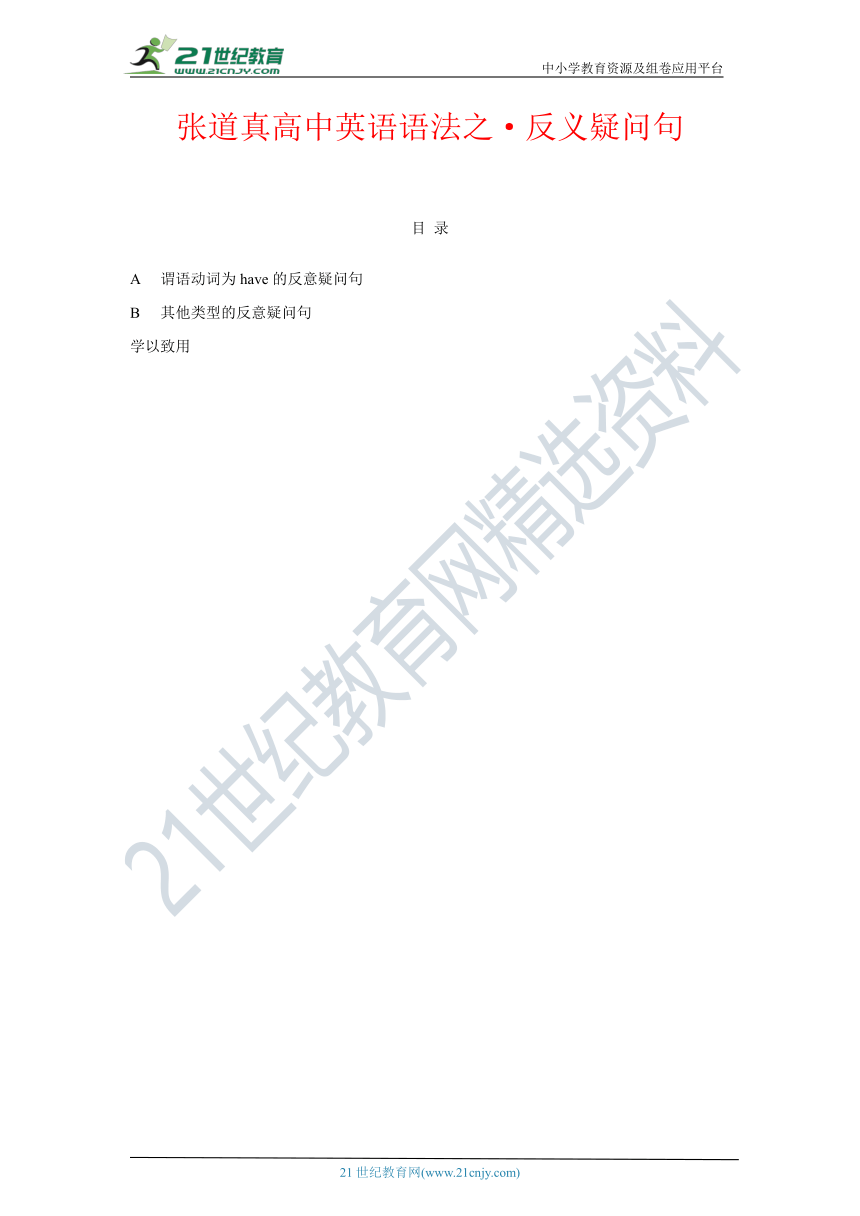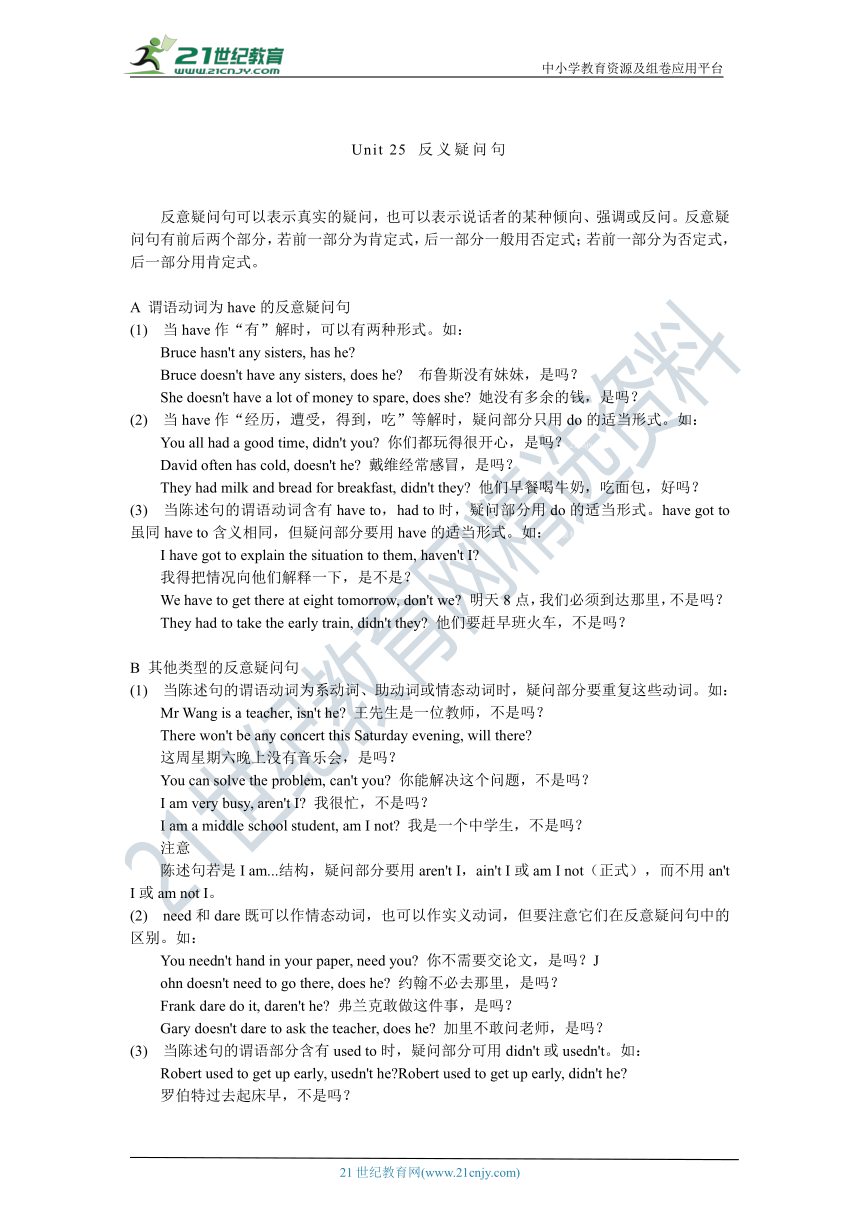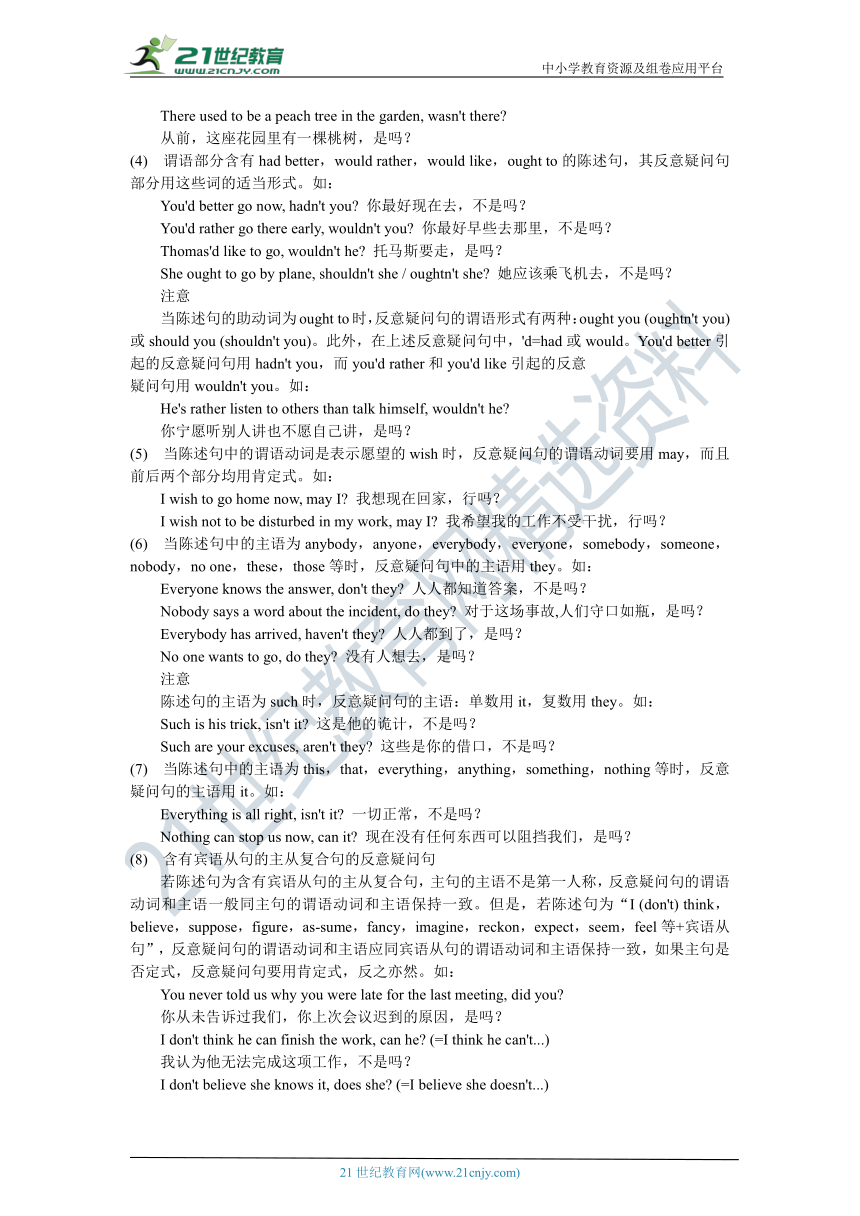高中英语语法之25反义疑问句
图片预览



文档简介
中小学教育资源及组卷应用平台
张道真高中英语语法之·反义疑问句
目 录
A 谓语动词为have的反意疑问句
B 其他类型的反意疑问句
学以致用
Unit 25 反义疑问句
反意疑问句可以表示真实的疑 ( http: / / www.21cnjy.com )问,也可以表示说话者的某种倾向、强调或反问。反意疑问句有前后两个部分,若前一部分为肯定式,后一部分一般用否定式;若前一部分为否定式,后一部分用肯定式。21教育网
A 谓语动词为have的反意疑问句
(1) 当have作“有”解时,可以有两种形式。如:
Bruce hasn't any sisters, has he
Bruce doesn't have any sisters, does he 布鲁斯没有妹妹,是吗?
She doesn't have a lot of money to spare, does she 她没有多余的钱,是吗?
(2) 当have作“经历,遭受,得到,吃”等解时,疑问部分只用do的适当形式。如:
You all had a good time, didn't you 你们都玩得很开心,是吗?21cnjy.com
David often has cold, doesn't he 戴维经常感冒,是吗?
They had milk and bread for breakfast, didn't they 他们早餐喝牛奶,吃面包,好吗?
(3) 当陈述句的谓语动词含有have ( http: / / www.21cnjy.com )to,had to时,疑问部分用do的适当形式。have got to虽同have to含义相同,但疑问部分要用have的适当形式。如:【版权所有:21教育】
I have got to explain the situation to them, haven't I
我得把情况向他们解释一下,是不是?
We have to get ( http: / / www.21cnjy.com ) there at eight tomorrow, don't we 明天8点,我们必须到达那里,不是吗?
They had to take the early train, didn't they 他们要赶早班火车,不是吗?
B 其他类型的反意疑问句
(1) 当陈述句的谓语动词为系动词、助动词或情态动词时,疑问部分要重复这些动词。如:
Mr Wang is a teacher, isn't he 王先生是一位教师,不是吗?
There won't be any concert this Saturday evening, will there 21·世纪*教育网
这周星期六晚上没有音乐会,是吗?
You can solve the problem, can't you 你能解决这个问题,不是吗?
I am very busy, aren't I 我很忙,不是吗?
I am a middle school student, am I not 我是一个中学生,不是吗?
注意
陈述句若是I am...结构,疑问部分要用aren't I,ain't I或am I not(正式),而不用an't I或am not I。2·1·c·n·j·y
(2) need和dare既可以作情态动词,也可以作实义动词,但要注意它们在反意疑问句中的区别。如:
You needn't hand in your paper, need you 你不需要交论文,是吗?J
ohn doesn't need to go there, does he 约翰不必去那里,是吗?
Frank dare do it, daren't he 弗兰克敢做这件事,是吗?
Gary doesn't dare to ask the teacher, does he 加里不敢问老师,是吗?
(3) 当陈述句的谓语部分含有used to时,疑问部分可用didn't或usedn't。如:
Robert used to ge ( http: / / www.21cnjy.com )t up early, usedn't he Robert used to get up early, didn't he
罗伯特过去起床早,不是吗?
There used to be a peach tree in the garden, wasn't there
从前,这座花园里有一棵桃树,是吗?
(4) 谓语部分含有had bett ( http: / / www.21cnjy.com )er,would rather,would like,ought to的陈述句,其反意疑问句部分用这些词的适当形式。如:
You'd better go now, hadn't you 你最好现在去,不是吗?
You'd rather go there early, wouldn't you 你最好早些去那里,不是吗?
Thomas'd like to go, wouldn't he 托马斯要走,是吗?
She ought to go by p ( http: / / www.21cnjy.com )lane, shouldn't she / oughtn't she 她应该乘飞机去,不是吗?
注意
当陈述句的助动词为ought t ( http: / / www.21cnjy.com )o时,反意疑问句的谓语形式有两种:ought you (oughtn't you)或should you (shouldn't you)。此外,在上述反意疑问句中,'d=had或would。You'd better引起的反意疑问句用hadn't you,而you'd rather和you'd like引起的反意
疑问句用wouldn't you。如:
He's rather listen to others than talk himself, wouldn't he
你宁愿听别人讲也不愿自己讲,是吗?
(5) 当陈述句中的谓语动词是表示愿望的wish时,反意疑问句的谓语动词要用may,而且前后两个部分均用肯定式。如:
I wish to go home now, may I 我想现在回家,行吗?
I wish not to be disturbed in my work, may I 我希望我的工作不受干扰,行吗?
(6) 当陈述句中的主语为anybod ( http: / / www.21cnjy.com )y,anyone,everybody,everyone,somebody,someone,nobody,no one,these,those等时,反意疑问句中的主语用they。如:
Everyone knows the answer, don't they 人人都知道答案,不是吗?
Nobody says a word about the incident, do they 对于这场事故,人们守口如瓶,是吗?
Everybody has arrived, haven't they 人人都到了,是吗?
No one wants to go, do they 没有人想去,是吗?
注意
陈述句的主语为such时,反意疑问句的主语:单数用it,复数用they。如:
Such is his trick, isn't it 这是他的诡计,不是吗?
Such are your excuses, aren't they 这些是你的借口,不是吗? 2-1-c-n-j-y
(7) 当陈述句中的主语为this, ( http: / / www.21cnjy.com )that,everything,anything,something,nothing等时,反意疑问句的主语用it。如:
Everything is all right, isn't it 一切正常,不是吗?
Nothing can stop us now, can it 现在没有任何东西可以阻挡我们,是吗?
(8) 含有宾语从句的主从复合句的反意疑问句
若陈述句为含有宾语从句的主从复合 ( http: / / www.21cnjy.com )句,主句的主语不是第一人称,反意疑问句的谓语动词和主语一般同主句的谓语动词和主语保持一致。但是,若陈述句为“I (don't) think,believe,suppose,figure,as-sume,fancy,imagine,reckon,expect,seem,feel等+宾语从句”,反意疑问句的谓语动词和主语应同宾语从句的谓语动词和主语保持一致,如果主句是否定式,反意疑问句要用肯定式,反之亦然。如:
You never told us why you were late for the last meeting, did you
你从未告诉过我们,你上次会议迟到的原因,是吗?
I don't think he can finish the work, can he (=I think he can't...)
我认为他无法完成这项工作,不是吗?
I don't believe she knows it, does she (=I believe she doesn't...)
我认为她不知道这件事,是吗?
You don't think she is more anxious to go there than others, do you
你认为她不比别人更渴望去那里,是吗?
We had never thought she would play so well in the match, had we
我们从没想到她在比赛中能发挥得这么好,是不是?
注意
在“It doesn't seem +that从句”等类似结构中,反意疑问句的主语和谓语同从句的主语和谓语保持一致。如:
It doesn't seem that they were lying, were they 他们似乎没有撒谎,不是吗?
It seems that he is the right person for the job, isn't he
看来他是这项工作的合适人选,不是吗?
(9) 含有主语从句和表语从句的主从复合句的反意疑问句
如果主语从句或表语从句由 ( http: / / www.21cnjy.com )whether,if,who,what,which,where,how,when等引导,反意疑问句应对应于主句;如果主语是从句,其后反意疑问句的主语要用it。如:
[主语从句]
What he lacks is courage, isn't it 他缺少的是勇气,对吗?
How you will handle the matter is for you to decide, isn't it
你来决定将如何处理这个问题,不是吗?
[表语从句]
Things were not as you imagined, were they 事情并不像你想的那样,不是吗?
That's where you are wrong, isn't it 那就是你错误的地方,不是吗?
(10) 如果陈述句中含有表示否 ( http: / / www.21cnjy.com )定意义的词,如few,hardly,little,never,no one,nobody,nothing,rarely,scarcely,seldom,nowhere等时,反意疑问句要用肯定式。如:
He has few good reasons for staying, has he 他没有足够的理由留下来,是吗?
She hardly writes to you, does she 她很少给你写信,是吗?
You see little of him, do you 你很少看见他,是吗?
注意
(1) 如果陈述句的否定词仅带有否定前缀或否定后缀,反意疑问句要用否定式。如:
The man is careless, isn't he 那个男人是粗心的,不是吗?
The medicine is useless, isn't it 这种药没有用,是吗?
The driver was uneasy about the icy roads, wasn't he www.21-cn-jy.com
司机对结了冰的道路感到不安,不是吗?
(2) 如果陈述句中的谓语动词仅是含有否定意义的动词,反意疑问句要用否定形式。如:
She failed to obtain a scholarship, didn't she 她没有获得奖学金,是吗?
(11) 祈使句的反意疑问句通常只用肯定式。
Let's引导的祈使句,其反意疑问句通常用shall we。如:
Let's have a meeting, shall we 我们开会吧,好吗?
The weather being fine, let's go swimming, shall we 天气不错,我们去游泳,好吗?
由动词原形或let us引导的祈使句,其反意疑问句通常用will you。如:
Read the text, will you 请读课文,好吗?
Let us do something to prevent the air being polluted, will you 【来源:21cnj*y.co*m】
让我们采取措施阻止空气被污染,好吗?
注意
(1) Let us不是let's,let us是请求对方“让我们……”,意为“you let us”。如:
Let him go with you, will you 让他跟你一起走,好吗?
(2) 为使祈使句听起来婉 ( http: / / www.21cnjy.com )转、客气,还可以用would you,won't you,can you,could you,can't you等。如:【出处:21教育名师】
Open the windows, won't you 请打开窗户,好吗?
Lend me this book, could you 把这本书借给我,好吗?
(3) 在否定祈使句后只能用will you。如:
Don't forget to post the letter, will you 不要忘了寄这封信,好吗?
Never trouble trouble till trouble troubles you, will you 21教育名师原创作品
不要惹麻烦,除非麻烦惹你,好吗?
(4) 以 let me开头的祈使句,反意疑问句可用will you或may I。如:
Let me have a look, will you 让我看看,好吗?
Let me do it for you, may I 让我为你做这件事,好吗?
(12) 感叹句的反意疑问句一律用否定式,而且要用be动词的一般现在时。
在这种句子里,主语是人时,用he或you 等人称代词;主语是物时,用it,这类反意疑问句多用升调。如:
What a lovely day, isn't it 多好的天气啊,是吗?
What a stupid fellow, isn't he 多傻的小子,是不是?
How cold the water is, isn't it 水多么凉爽,是吗?
(13) 陈述句中must表“猜 ( http: / / www.21cnjy.com )测”时,其后动词的类属和时态不同,反意疑问句也不同;must表“必要性”时,反意疑问句常用must或need的适当形式。如:
Your mother must be anxious to know the particulars, isn't she
你的母亲一定想急于了解详情,是吗?
You must ha ( http: / / www.21cnjy.com )ve seen the film last week, didn't you 上星期,你一定看过这部电影,是吗?
You mustn't sort with theives, must you 你绝不能与盗贼为伍,不是吗?
A judge mu ( http: / / www.21cnjy.com )st deal out justice to all men, needn't he 法官必须对每个人都公正,不是吗?
(14) 当陈述句中的谓语动词含有情态动词may或might时,反意疑问句要用may或might的适当形式。如:21·cn·jy·com
I may have made a mistake in the count, mayn't I
我在数的过程中有可能数错了,不是吗?
The experience may have been long in your memory, mayn't it
经验在你的记忆中可能会永存,不是吗?
You might tell them that I hope to be back tomorrow night, will you
你可以告诉他们,我希望明晚回来,行吗?
(15) 当陈述句的主语是动词不定式、动名词时,反意疑问句的主语用it。如:
To kick a cat is a cruel, isn't it 踢猫是残忍的行为,不是吗?
Doing crosswords gives the mind some exercise, doesn't it
做纵横字谜游戏能锻炼脑筋,不是吗?
Doing morning exercises has helped to improve her health, hasn't it
做早操有助于增进她的健康,是吗?
(16) 当陈述句的主语为 ( http: / / www.21cnjy.com )each of...结构时,反意疑问句主语用he,she或it,强调“各个,各自”;用we,you或they,强调“全体”。如:
Each of the visitors was presented with a souvenir, isn't he
每位来宾都得到了纪念品,是吗?
Each of us have got the prize, haven't we 我们每位都得了奖,不是吗?
(17) 当陈述句的主语为one时,反意疑问句的主语在正式场合用one,非正式场合用you。如:
One should be exact in his statement, shouldn't one 一个人应该说话严谨,不是吗?
Ones should do one's best for the country, shouldn't one
人应对自己的国家尽忠,不是吗?
One could hear ev ( http: / / www.21cnjy.com )ery subject under the sun being hotly discussed, couldn't you
你们可以听到天南海北什么都谈得很热烈,不是吗?
(18) none of...结构作主语时,反意疑问句谓语动词的人称和数要同前面的陈述部分一致。如:
None of his relatives are close by, are they 他的亲戚没有一个关系密切的,是吗?
None of his arguments seems to me to hold water, does it
在我看来,他的论点没有一个能成立,不是吗?
None of the others have lived my experience, have they
别人都不曾有过我这样的经历,不是吗?
(19) neither...nor...本身已是否定结构,故反意疑问句要用肯定式。如:
The book is neither in Chinese nor in English, is it
这本书既不是用中文写的,也不是用英文写的,是吗?
He can neither read nor write, can he 他既不会读,也不会写,是不是?
(20) 有一种反意疑问句,同陈述句的谓 ( http: / / www.21cnjy.com )语形式保持一致,都是肯定形式或都是否定形式,这种问句一般用升调,表示关心、惊讶、怀疑和愤怒等感情。如:
[关心]
You look pale. You ( http: / / www.21cnjy.com )are not feeling well, aren't you 你脸色苍白,感觉不舒服,对吗?
[惊奇]
You don't like the film, don't you 你不喜欢这部电影,是不是?21*cnjy*com
[遗憾]
It wasn't a very good book, wasn't it 这不是一本好书,是不是?
[讽刺]
So that's your little trick, is it 那就是你的伎俩,对吗?
[威吓]
You won't pay the money, won't you 你不付钱,是吗?
[愤怒]
“You want to fool me, do you ” She warned the man.
“你想耍我,不是吗?”她警告那个人。
(21) 英语中有少量不变的附 ( http: / / www.21cnjy.com )加疑问句,形式固定,不随其前面陈述句的谓语动词等的变化而变化,这种问句是希望听话人作出反应。常用的词和短语有:eh,right,don't you think,am I right,isn't that so等。如:
That's a good book, eh 那是一本不错的书,是吗?
The book is really helpful, don't you think 这本书真的很有用,不是吗?
She has got married, isn't that true 她已经结婚了,不是真的吗?
You have read the poem, am I right 你已经读过那首诗了,对吗?
21世纪教育网 www.21cnjy.com 精品试卷·第 2 页 (共 2 页)
HYPERLINK "http://21世纪教育网(www.21cnjy.com)
" 21世纪教育网(www.21cnjy.com)
张道真高中英语语法之·反义疑问句
目 录
A 谓语动词为have的反意疑问句
B 其他类型的反意疑问句
学以致用
Unit 25 反义疑问句
反意疑问句可以表示真实的疑 ( http: / / www.21cnjy.com )问,也可以表示说话者的某种倾向、强调或反问。反意疑问句有前后两个部分,若前一部分为肯定式,后一部分一般用否定式;若前一部分为否定式,后一部分用肯定式。21教育网
A 谓语动词为have的反意疑问句
(1) 当have作“有”解时,可以有两种形式。如:
Bruce hasn't any sisters, has he
Bruce doesn't have any sisters, does he 布鲁斯没有妹妹,是吗?
She doesn't have a lot of money to spare, does she 她没有多余的钱,是吗?
(2) 当have作“经历,遭受,得到,吃”等解时,疑问部分只用do的适当形式。如:
You all had a good time, didn't you 你们都玩得很开心,是吗?21cnjy.com
David often has cold, doesn't he 戴维经常感冒,是吗?
They had milk and bread for breakfast, didn't they 他们早餐喝牛奶,吃面包,好吗?
(3) 当陈述句的谓语动词含有have ( http: / / www.21cnjy.com )to,had to时,疑问部分用do的适当形式。have got to虽同have to含义相同,但疑问部分要用have的适当形式。如:【版权所有:21教育】
I have got to explain the situation to them, haven't I
我得把情况向他们解释一下,是不是?
We have to get ( http: / / www.21cnjy.com ) there at eight tomorrow, don't we 明天8点,我们必须到达那里,不是吗?
They had to take the early train, didn't they 他们要赶早班火车,不是吗?
B 其他类型的反意疑问句
(1) 当陈述句的谓语动词为系动词、助动词或情态动词时,疑问部分要重复这些动词。如:
Mr Wang is a teacher, isn't he 王先生是一位教师,不是吗?
There won't be any concert this Saturday evening, will there 21·世纪*教育网
这周星期六晚上没有音乐会,是吗?
You can solve the problem, can't you 你能解决这个问题,不是吗?
I am very busy, aren't I 我很忙,不是吗?
I am a middle school student, am I not 我是一个中学生,不是吗?
注意
陈述句若是I am...结构,疑问部分要用aren't I,ain't I或am I not(正式),而不用an't I或am not I。2·1·c·n·j·y
(2) need和dare既可以作情态动词,也可以作实义动词,但要注意它们在反意疑问句中的区别。如:
You needn't hand in your paper, need you 你不需要交论文,是吗?J
ohn doesn't need to go there, does he 约翰不必去那里,是吗?
Frank dare do it, daren't he 弗兰克敢做这件事,是吗?
Gary doesn't dare to ask the teacher, does he 加里不敢问老师,是吗?
(3) 当陈述句的谓语部分含有used to时,疑问部分可用didn't或usedn't。如:
Robert used to ge ( http: / / www.21cnjy.com )t up early, usedn't he Robert used to get up early, didn't he
罗伯特过去起床早,不是吗?
There used to be a peach tree in the garden, wasn't there
从前,这座花园里有一棵桃树,是吗?
(4) 谓语部分含有had bett ( http: / / www.21cnjy.com )er,would rather,would like,ought to的陈述句,其反意疑问句部分用这些词的适当形式。如:
You'd better go now, hadn't you 你最好现在去,不是吗?
You'd rather go there early, wouldn't you 你最好早些去那里,不是吗?
Thomas'd like to go, wouldn't he 托马斯要走,是吗?
She ought to go by p ( http: / / www.21cnjy.com )lane, shouldn't she / oughtn't she 她应该乘飞机去,不是吗?
注意
当陈述句的助动词为ought t ( http: / / www.21cnjy.com )o时,反意疑问句的谓语形式有两种:ought you (oughtn't you)或should you (shouldn't you)。此外,在上述反意疑问句中,'d=had或would。You'd better引起的反意疑问句用hadn't you,而you'd rather和you'd like引起的反意
疑问句用wouldn't you。如:
He's rather listen to others than talk himself, wouldn't he
你宁愿听别人讲也不愿自己讲,是吗?
(5) 当陈述句中的谓语动词是表示愿望的wish时,反意疑问句的谓语动词要用may,而且前后两个部分均用肯定式。如:
I wish to go home now, may I 我想现在回家,行吗?
I wish not to be disturbed in my work, may I 我希望我的工作不受干扰,行吗?
(6) 当陈述句中的主语为anybod ( http: / / www.21cnjy.com )y,anyone,everybody,everyone,somebody,someone,nobody,no one,these,those等时,反意疑问句中的主语用they。如:
Everyone knows the answer, don't they 人人都知道答案,不是吗?
Nobody says a word about the incident, do they 对于这场事故,人们守口如瓶,是吗?
Everybody has arrived, haven't they 人人都到了,是吗?
No one wants to go, do they 没有人想去,是吗?
注意
陈述句的主语为such时,反意疑问句的主语:单数用it,复数用they。如:
Such is his trick, isn't it 这是他的诡计,不是吗?
Such are your excuses, aren't they 这些是你的借口,不是吗? 2-1-c-n-j-y
(7) 当陈述句中的主语为this, ( http: / / www.21cnjy.com )that,everything,anything,something,nothing等时,反意疑问句的主语用it。如:
Everything is all right, isn't it 一切正常,不是吗?
Nothing can stop us now, can it 现在没有任何东西可以阻挡我们,是吗?
(8) 含有宾语从句的主从复合句的反意疑问句
若陈述句为含有宾语从句的主从复合 ( http: / / www.21cnjy.com )句,主句的主语不是第一人称,反意疑问句的谓语动词和主语一般同主句的谓语动词和主语保持一致。但是,若陈述句为“I (don't) think,believe,suppose,figure,as-sume,fancy,imagine,reckon,expect,seem,feel等+宾语从句”,反意疑问句的谓语动词和主语应同宾语从句的谓语动词和主语保持一致,如果主句是否定式,反意疑问句要用肯定式,反之亦然。如:
You never told us why you were late for the last meeting, did you
你从未告诉过我们,你上次会议迟到的原因,是吗?
I don't think he can finish the work, can he (=I think he can't...)
我认为他无法完成这项工作,不是吗?
I don't believe she knows it, does she (=I believe she doesn't...)
我认为她不知道这件事,是吗?
You don't think she is more anxious to go there than others, do you
你认为她不比别人更渴望去那里,是吗?
We had never thought she would play so well in the match, had we
我们从没想到她在比赛中能发挥得这么好,是不是?
注意
在“It doesn't seem +that从句”等类似结构中,反意疑问句的主语和谓语同从句的主语和谓语保持一致。如:
It doesn't seem that they were lying, were they 他们似乎没有撒谎,不是吗?
It seems that he is the right person for the job, isn't he
看来他是这项工作的合适人选,不是吗?
(9) 含有主语从句和表语从句的主从复合句的反意疑问句
如果主语从句或表语从句由 ( http: / / www.21cnjy.com )whether,if,who,what,which,where,how,when等引导,反意疑问句应对应于主句;如果主语是从句,其后反意疑问句的主语要用it。如:
[主语从句]
What he lacks is courage, isn't it 他缺少的是勇气,对吗?
How you will handle the matter is for you to decide, isn't it
你来决定将如何处理这个问题,不是吗?
[表语从句]
Things were not as you imagined, were they 事情并不像你想的那样,不是吗?
That's where you are wrong, isn't it 那就是你错误的地方,不是吗?
(10) 如果陈述句中含有表示否 ( http: / / www.21cnjy.com )定意义的词,如few,hardly,little,never,no one,nobody,nothing,rarely,scarcely,seldom,nowhere等时,反意疑问句要用肯定式。如:
He has few good reasons for staying, has he 他没有足够的理由留下来,是吗?
She hardly writes to you, does she 她很少给你写信,是吗?
You see little of him, do you 你很少看见他,是吗?
注意
(1) 如果陈述句的否定词仅带有否定前缀或否定后缀,反意疑问句要用否定式。如:
The man is careless, isn't he 那个男人是粗心的,不是吗?
The medicine is useless, isn't it 这种药没有用,是吗?
The driver was uneasy about the icy roads, wasn't he www.21-cn-jy.com
司机对结了冰的道路感到不安,不是吗?
(2) 如果陈述句中的谓语动词仅是含有否定意义的动词,反意疑问句要用否定形式。如:
She failed to obtain a scholarship, didn't she 她没有获得奖学金,是吗?
(11) 祈使句的反意疑问句通常只用肯定式。
Let's引导的祈使句,其反意疑问句通常用shall we。如:
Let's have a meeting, shall we 我们开会吧,好吗?
The weather being fine, let's go swimming, shall we 天气不错,我们去游泳,好吗?
由动词原形或let us引导的祈使句,其反意疑问句通常用will you。如:
Read the text, will you 请读课文,好吗?
Let us do something to prevent the air being polluted, will you 【来源:21cnj*y.co*m】
让我们采取措施阻止空气被污染,好吗?
注意
(1) Let us不是let's,let us是请求对方“让我们……”,意为“you let us”。如:
Let him go with you, will you 让他跟你一起走,好吗?
(2) 为使祈使句听起来婉 ( http: / / www.21cnjy.com )转、客气,还可以用would you,won't you,can you,could you,can't you等。如:【出处:21教育名师】
Open the windows, won't you 请打开窗户,好吗?
Lend me this book, could you 把这本书借给我,好吗?
(3) 在否定祈使句后只能用will you。如:
Don't forget to post the letter, will you 不要忘了寄这封信,好吗?
Never trouble trouble till trouble troubles you, will you 21教育名师原创作品
不要惹麻烦,除非麻烦惹你,好吗?
(4) 以 let me开头的祈使句,反意疑问句可用will you或may I。如:
Let me have a look, will you 让我看看,好吗?
Let me do it for you, may I 让我为你做这件事,好吗?
(12) 感叹句的反意疑问句一律用否定式,而且要用be动词的一般现在时。
在这种句子里,主语是人时,用he或you 等人称代词;主语是物时,用it,这类反意疑问句多用升调。如:
What a lovely day, isn't it 多好的天气啊,是吗?
What a stupid fellow, isn't he 多傻的小子,是不是?
How cold the water is, isn't it 水多么凉爽,是吗?
(13) 陈述句中must表“猜 ( http: / / www.21cnjy.com )测”时,其后动词的类属和时态不同,反意疑问句也不同;must表“必要性”时,反意疑问句常用must或need的适当形式。如:
Your mother must be anxious to know the particulars, isn't she
你的母亲一定想急于了解详情,是吗?
You must ha ( http: / / www.21cnjy.com )ve seen the film last week, didn't you 上星期,你一定看过这部电影,是吗?
You mustn't sort with theives, must you 你绝不能与盗贼为伍,不是吗?
A judge mu ( http: / / www.21cnjy.com )st deal out justice to all men, needn't he 法官必须对每个人都公正,不是吗?
(14) 当陈述句中的谓语动词含有情态动词may或might时,反意疑问句要用may或might的适当形式。如:21·cn·jy·com
I may have made a mistake in the count, mayn't I
我在数的过程中有可能数错了,不是吗?
The experience may have been long in your memory, mayn't it
经验在你的记忆中可能会永存,不是吗?
You might tell them that I hope to be back tomorrow night, will you
你可以告诉他们,我希望明晚回来,行吗?
(15) 当陈述句的主语是动词不定式、动名词时,反意疑问句的主语用it。如:
To kick a cat is a cruel, isn't it 踢猫是残忍的行为,不是吗?
Doing crosswords gives the mind some exercise, doesn't it
做纵横字谜游戏能锻炼脑筋,不是吗?
Doing morning exercises has helped to improve her health, hasn't it
做早操有助于增进她的健康,是吗?
(16) 当陈述句的主语为 ( http: / / www.21cnjy.com )each of...结构时,反意疑问句主语用he,she或it,强调“各个,各自”;用we,you或they,强调“全体”。如:
Each of the visitors was presented with a souvenir, isn't he
每位来宾都得到了纪念品,是吗?
Each of us have got the prize, haven't we 我们每位都得了奖,不是吗?
(17) 当陈述句的主语为one时,反意疑问句的主语在正式场合用one,非正式场合用you。如:
One should be exact in his statement, shouldn't one 一个人应该说话严谨,不是吗?
Ones should do one's best for the country, shouldn't one
人应对自己的国家尽忠,不是吗?
One could hear ev ( http: / / www.21cnjy.com )ery subject under the sun being hotly discussed, couldn't you
你们可以听到天南海北什么都谈得很热烈,不是吗?
(18) none of...结构作主语时,反意疑问句谓语动词的人称和数要同前面的陈述部分一致。如:
None of his relatives are close by, are they 他的亲戚没有一个关系密切的,是吗?
None of his arguments seems to me to hold water, does it
在我看来,他的论点没有一个能成立,不是吗?
None of the others have lived my experience, have they
别人都不曾有过我这样的经历,不是吗?
(19) neither...nor...本身已是否定结构,故反意疑问句要用肯定式。如:
The book is neither in Chinese nor in English, is it
这本书既不是用中文写的,也不是用英文写的,是吗?
He can neither read nor write, can he 他既不会读,也不会写,是不是?
(20) 有一种反意疑问句,同陈述句的谓 ( http: / / www.21cnjy.com )语形式保持一致,都是肯定形式或都是否定形式,这种问句一般用升调,表示关心、惊讶、怀疑和愤怒等感情。如:
[关心]
You look pale. You ( http: / / www.21cnjy.com )are not feeling well, aren't you 你脸色苍白,感觉不舒服,对吗?
[惊奇]
You don't like the film, don't you 你不喜欢这部电影,是不是?21*cnjy*com
[遗憾]
It wasn't a very good book, wasn't it 这不是一本好书,是不是?
[讽刺]
So that's your little trick, is it 那就是你的伎俩,对吗?
[威吓]
You won't pay the money, won't you 你不付钱,是吗?
[愤怒]
“You want to fool me, do you ” She warned the man.
“你想耍我,不是吗?”她警告那个人。
(21) 英语中有少量不变的附 ( http: / / www.21cnjy.com )加疑问句,形式固定,不随其前面陈述句的谓语动词等的变化而变化,这种问句是希望听话人作出反应。常用的词和短语有:eh,right,don't you think,am I right,isn't that so等。如:
That's a good book, eh 那是一本不错的书,是吗?
The book is really helpful, don't you think 这本书真的很有用,不是吗?
She has got married, isn't that true 她已经结婚了,不是真的吗?
You have read the poem, am I right 你已经读过那首诗了,对吗?
21世纪教育网 www.21cnjy.com 精品试卷·第 2 页 (共 2 页)
HYPERLINK "http://21世纪教育网(www.21cnjy.com)
" 21世纪教育网(www.21cnjy.com)
